Have any questions?
Have any questions?
Sepsis is a malignant systemic inflammatory reaction with high morbidity and mortality. It is the main cause of death of non-heart disease patients in the intensive care unit. The central nervous system is one of the first systems affected by sepsis and can cause acute dysfunction such as delirium, disorientation, and unconsciousness. In the long term, patients with sepsis have obvious cognitive dysfunction and memory loss, and inflammatory reactive oxygen free radicals are one of the reasons that cause sepsis-induced memory loss. The anti-inflammatory and antioxidant effects of hydrogen molecules, especially its up-regulation of nuclear-related factor 2 (Nrf2), may alleviate neuroinflammation, and it is expected to become a treatment for memory loss in sepsis.
A study explored the effects of Hydrogen Molecules Generator on the survival rate, short-term and long-term memory and cognitive ability of septic rats based on the cecal ligation and perforation (CLP) model, and long-term hydrogen treatment on the memory and memory of septic rats. Improvement of cognitive function.First, the authors confirmed that the CLP model caused 53% of the mortality in the CLP air group, while the rats that received long-term PEM H2 inhaler Generator survived 81% (Figure 1). It shows that long-term hydrogen treatment improves the survival rate of septic animals. This increase in survival rate is related to the various properties of hydrogen, including antioxidant, anti-inflammatory and anti-apoptotic effects, which increase the chance of survival under infection or inflammation.
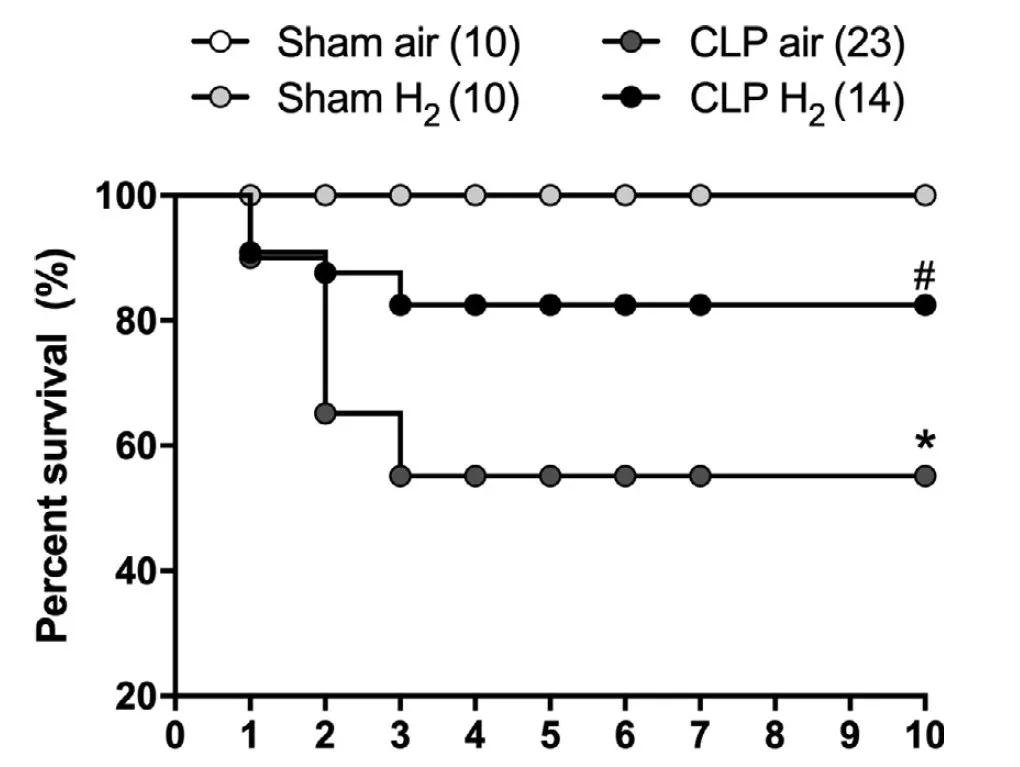
In order to determine whether hydrogen can attenuate long-term cognitive impairment, the researchers placed the rats in a test environment for a 5-minute experiment after 24 hours of cognitive training. When reintroduced into the previously explored environment, the movement distance and standing activity of the rats in the CLP hydrogen group were significantly reduced compared with the CLP air animals (Figure 2B&D). The results showed that hydrogen treatment restored memory loss in septic rats.
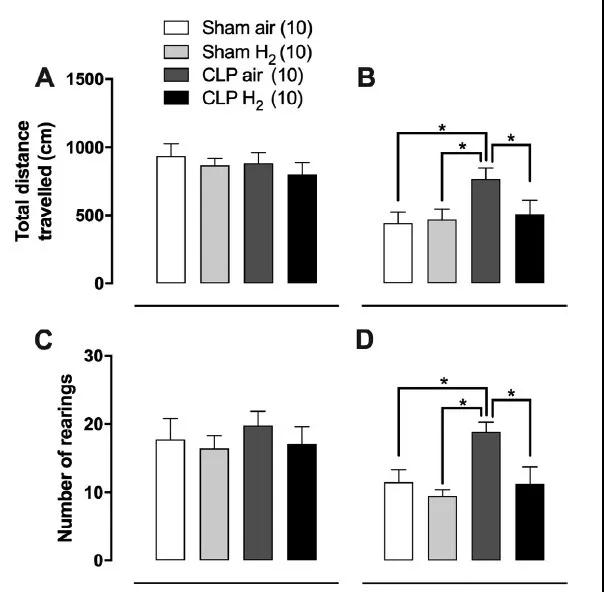
The author also analyzed whether hydrogen can improve the short-term recognition and memory impairment of CLP rats after 20 minutes of training. In the short-term memory test, compared with sham-operated rats, air-treated CLP rats had a shorter time to explore new objects (Figure 3B), indicating that the short-term recognition memory of septic rats was impaired. Compared with CLP rats, hydrogen treatment significantly reversed memory impairment, indicating that hydrogen has a protective effect on short-term recognition and memory after sepsis (Figure 3).
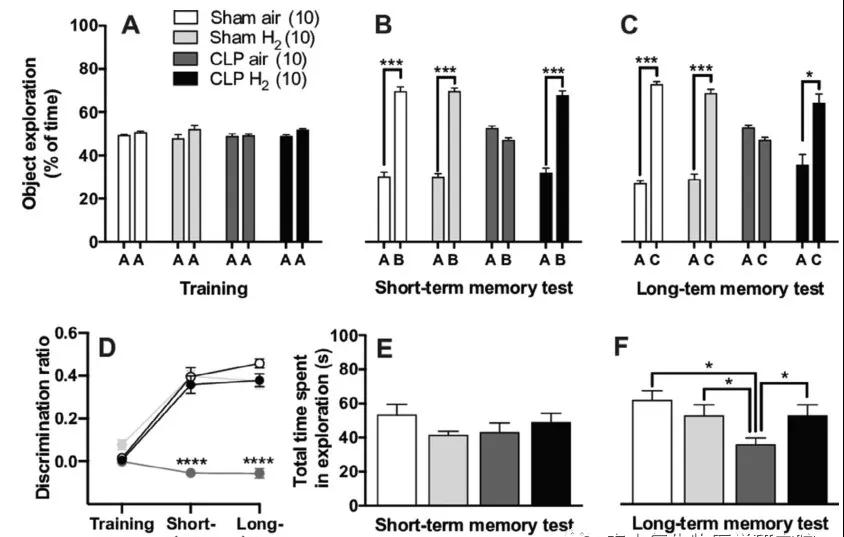
One of the main symptoms of cognitive impairment is memory loss. Because hydrogen molecules can improve the short-term and long-term recognition memory impairment caused by non-white matter, the researchers proposed whether the same can be observed in the cognitive impairment caused by sepsis in rats. The protective effect. At first, the rats were trained to conditioned their fear conditioned reflexes. This response is obtained through associative learning between the field and the harmful stimulus, resulting in freezing behavior in the animal. During the conditioning process, there was no significant difference in the sluggish rate between all experimental groups (Figure 4A). When the test 1 day and 5 days later, the sluggish behavior of rats in the CLP air group was significantly more than that of the sham air group and the sham hydrogen molecule group, confirming the establishment of the cognitive impairment model (Figure 4B&4C). After hydrogen molecule treatment, the sluggish response of CLP rats observed in the two long-term memory tests was significantly reduced, indicating that hydrogen molecule improved the impaired cognitive memory of septic animals (Figure 4B&4C).
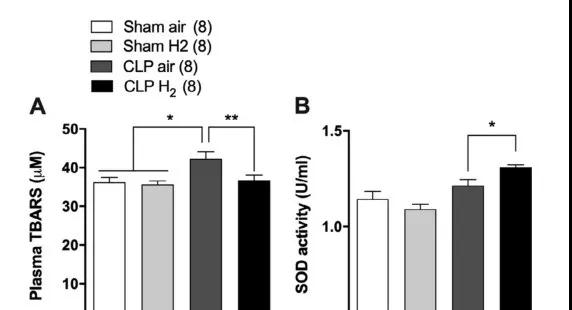
The systemic oxidative stress state is measured by the measurement of plasma TBARS. The authors observed that lipid peroxidation occurred within 24 hours after sepsis induced a systemic inflammatory response. Sepsis caused a significantly higher plasma TBARS level than the sham operation group (Figure 5A). On the other hand, compared with the CLP air group, the plasma levels of TBARS in septic rats inhaled hydrogen were reduced (Figure 5A). The antioxidant status is evaluated by measuring the plasma superoxide dismutase (SOD) activity. The author observed that compared with the sham operation group and the CLP air group, hydrogen molecule therapy can increase the activity of SOD enzyme (Figure 5B).
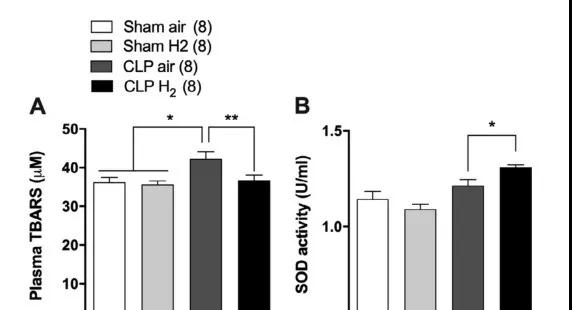
In addition, the authors detected the levels of pro-inflammatory cytokines (IL-1, β, and IL-6) and anti-inflammatory cytokines (IL-10) in the prefrontal cortex and hippocampus of septic rats to verify that hydrogen molecules are in the pus. Anti-inflammatory effect in toxins. Compared with the sham operation group, the levels of IL-1β and IL-6 in the prefrontal cortex of the air group were significantly increased (Figure 6B&6D); compared with the air treatment group, inhalation of hydrogen reduced these pro-inflammatory levels in the prefrontal cortex of the rat The production of cytokines (Figure 6B&6D). Compared with the control group, the levels of IL-10 in the hippocampus and prefrontal cortex of CLP rats that inhaled hydrogen molecules also increased.
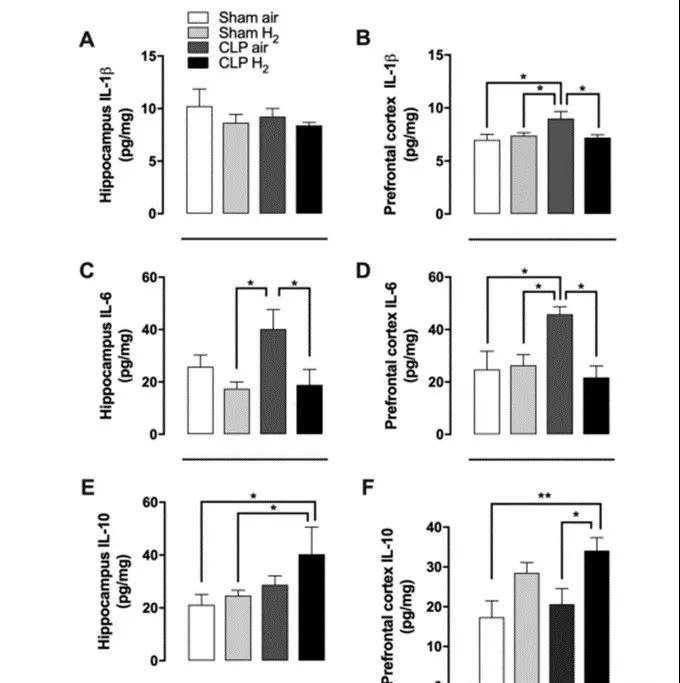
In order to evaluate the possible mechanisms of the antioxidant and anti-inflammatory effects of hydrogen molecules, the authors tested the expression of the transcription factor Nrf2. Using western blotting, it was observed that compared with the sham operation group and the CLP air group, the total Nrf2 expression in the hippocampus and prefrontal cortex of septic rats treated with hydrogen molecules increased (Figure 7). The effect of emergency inhalation of hydrogen molecules on the expression of Nrf2 in septic animals.
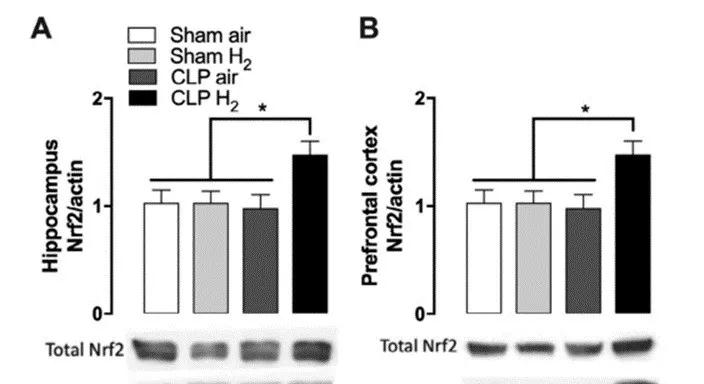
The evidence provided in this study shows that long-term (10 days) Hydrogen Inhalation Therapy Machine is an effective treatment for memory retention failure, impaired short-term recognition memory, and impaired short-term and long-term recognition memory formed by associative learning. Emergency treatment of hydrogen molecules can reduce neuroinflammation in the central structure directly related to memory formation.